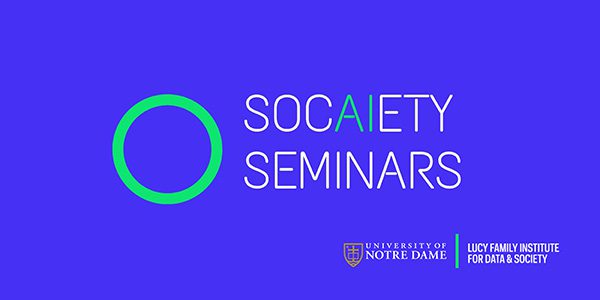The Global Church and Islam – The Church and Islam through the Centuries
Subscribe to the ThinkND podcast on Apple, Spotify, or Google.
Featured Speakers:
- Gabriel Said Reynolds, Jerome J. Crowley and Rosaleen G. Crowley Professor of Islamic Studies and Theology, University of Notre Dame; Author of Qur’an and the Bible and Allah: God in the Qur’an
- John Shinkwin, Graduate Student in Theology, University of Notre Dame
The second event of The Global Church and Islam series featured Gabriel Reynolds, the Jerome J. Crowley and Rosaleen G. Crowley Professor of Theology at the University of Notre Dame. Throughout the event, he discussed the long and tumultuous history of Muslim-Christian relations, yet also emphasized the hope that can be found in the periods of great friendship among them. He addressed historical events, such as the Islamic conquests and the Crusades, as well as the opportunities for improvement in Muslim relations within the Catholic Church. The event was moderated by John Shinkwin, a graduate student in the Department of Theology at the University of Notre Dame.
Beginning in the early days of Christianity, Reynolds discussed the Qur’an and other early Islamic sources and how they have informed relations between members of the two religions throughout history. Twice in different chapters of the Qur’an, the work assures other religious groups, including Christians, that they are also included in the Muslim divine providence. Though there are also verses in the Qur’an that contradict Christian beliefs and condemn Christians for their belief in Jesus as the Son of God, Muslims are generally accepting of Christian beliefs and willing to cultivate friendships with Christians. Reynolds highlighted that throughout the life of Muhammad, the Muslim relationship with Christians varied greatly and that the differing perspectives of the Qur’an simply capture these differences. At the end of the day, the beliefs between Islam and Christianity are different. However, it is possible to get along despite different beliefs, something that the Qur’an clearly communicates.
Moving on, Reynolds then discussed two subjects that weigh heavily on the minds of those who study these two religions: the Islamic conquests and the Crusades. Starting with the Islamic conquests, Reynolds drew participants’ attention to the fact that though Muslims expanded their political authority and took taxes from Christians during this time, these were not conquests of massacre. They did not imprison Christians or force them to convert to Islam. In fact, Christians were allowed to continue practicing Christianity in the conquested cities. A common thought within the Islamic tradition is the importance of belief in one God in relations with other religions. Though Muslims had political superiority during this time, they respected Christian beliefs. Moving to the Crusades, Reynolds identified the long history of violence in Muslim-Christian relations. Though both of these events were trying times in the friendship between Muslims and Christians, there has been a long history of positive friendship as well.
To conclude his presentation, Reynolds discussed the Catholic Church’s successes and failures in its relationship with Muslims. He highlighted St. Francis of Assisi and Josephine Bakhita as figures of hope and evangelizers who held fast to their Catholic faith, but also modeled a positive friendship with members of Islam. Reynolds emphasized the Catholic Church’s responsibility to not only cultivate a friendship with Muslims, but also to support those Christians who live in areas of persecution. The Catholic Church has an obligation to believers everywhere. Shinkwin’s last formal question asked Reynolds what lessons have been learned about living in harmony with Muslims and how this can be cultivated in a world with an increasing Muslim population. Reynolds identified the need for religious solidarity and for seeing the things in common rather than the differences between the two religions. Christians and Muslims both believe in the practice of modesty, the sacredness of marriage, the importance of human dignity and the need for religious freedom. Just because the practices of Islam and Christianity vary, does not mean that a dialogue cannot be formed and friendship can’t be fostered.
To close out the event, Shinkwin asked a variety of questions from participants covering topics such as conversion and evangelization, as well as the Catholic teaching of divine mercy and the differences between Shia and Sunni Muslims in Christian relations. Before bidding participants farewell, the speakers posed questions for breakout room conversations: What did you find surprising or interesting about the relationship of the Church and Islam through the centuries? What lessons can be learned from the past of Muslim-Christian relations?
- The relations between Muslims and Christians in the early years of their histories inform how they relate today. (11:45)
- “At different moments, the prophet had different types of relationships with Christians and the Qur’an has captured those, the diversity of views.” (Gabriel Reynolds, 18:09)
- The Qur’an captures the varying beliefs and relationships of Muslims and Christians. It points out the theological differences, but also highlights the opportunity for social coexistence. (18:38)
- “For the most part, the story of the early Islamic empire is one of coexistence and one which in terms of its demography, the peoples who were living together, was remarkably diverse.” (Gabriel Reynolds, 25:19)
- Christian-Muslim relations have had periods of violence, yet there are many common beliefs and topics for discussion. The positive aspects of this relationship and the hope they offer should not be overshadowed by historical periods of violence and misunderstanding. (41:00)
- “The story of Muslim-Christian relations in the 20th and 21st centuries is overshadowed by these moments of great violence, but there are so many bright spots as well.” (Gabriel Reynolds, 41:00)
- In fostering a relationship with Muslims, the Catholic Church must balance its deep desire for friendship with them and its pastoral responsibility to members of the Catholic faith. (43:39)
- “Generally, the Church can do better, the Church being everyone, to be aware of the struggles of Christians not only in the Islamic world but also in other areas of persecution.” (Gabriel Reynolds, 46:28)
- In the United States and other countries, it is easy to get caught up in the domestic news cycle. However, it is important to remember our obligation to the experiences of believers everywhere. (47:51)
- “A signal can be made that the diversity of religions is not a formula for conflict, but a formula for friendship.” (Gabriel Reynolds, 52:14)
Related Content
Reunion 2024
Alumni Education Programming Click each program title to learn more. ND Perspectives: Election 2024 and the Future of Democracy in the U.S. The 2024 presidential election looms...
Read ArticleA Brave New World of AI Governance
Explore the connection between data, geopolitics and governance, regulation, self-regulation while discovering examples of good and bad practices in various sectors, such as...
View EventAlgorethics: potentiality and challenges in the age of AI
Explore the possibilities and challenges in ethical governance of AI through algorethics. Algorethics is a term that has been developed since 2018 to denote the need for a study...
View Event

